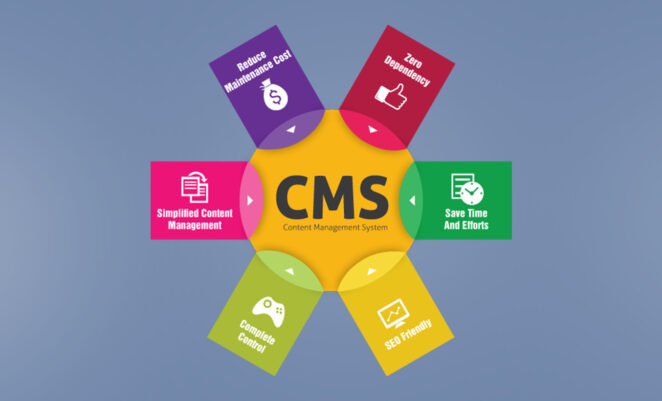The digital landscape continues to evolve at a rapid pace, and organizations worldwide must keep pace to maintain relevance and competitiveness. Enterprise-level digital transformation has become the battle cry for businesses seeking to adapt to these changes. Central to this transformation is the role of Content Management Systems (CMS). In this discourse, we’ll explore the impact of CMS on enterprise-level digital transformation.
The term “digital transformation” encapsulates a broad array of changes, from revamping customer interaction strategies to restructuring internal processes, all driven by digital technology. However, these digital interactions invariably revolve around one crucial element: content. Here, the CMS, a tool designed to manage digital content across various platforms, becomes a pivotal player.
Enterprise CMS development

In the digital age, managing your business’s online content effectively is critical to ensuring a seamless and engaging user experience. This is where Enterprise CMS Web Development Services step in, offering a tailored approach to content management that aligns with your unique business needs.
One of the most tangible impacts of CMS on digital transformation is its ability to enhance customer experiences. Today’s CMSs are capable of delivering personalized, consistent, and engaging content across a multitude of channels, be it websites, mobile apps, or social media platforms. They allow for tailoring content to the user’s preferences, location, behavior, and more. This personalized engagement can dramatically improve customer satisfaction and brand loyalty, driving customer-centric digital transformation forward.
On the other hand, the influence of CMS on internal operations is no less profound. CMSs offer centralized content management, allowing teams to create, edit, manage, and publish content from a unified platform. They also support collaboration among teams, improving workflow efficiency, and thereby accelerating the speed of transformation.
Additionally, CMSs can profoundly impact data-driven decision making, a critical aspect of digital transformation. Modern CMSs can integrate with analytics tools, providing businesses with crucial insights about user behavior, engagement metrics, and content performance. This data can drive informed decision-making, help in refining content strategies, and ultimately contribute to the overall effectiveness of digital transformation initiatives.
Not to mention, CMSs play a critical role in handling the regulatory compliance aspect of digital transformation. They provide robust security features and adhere to various standards and regulations, like GDPR, HIPAA, etc., ensuring content security and privacy.
In the current landscape, headless CMSs are becoming a prominent player in digital transformation. Unlike traditional CMSs, a headless CMS separates the content presentation layer from the management system, offering greater flexibility in delivering content across various touchpoints. This “decoupled” architecture can significantly contribute to the speed and agility of digital transformation processes.
However, the implementation of a CMS must be thoughtful and strategic. The choice of CMS should align with the organization’s business goals, technical capabilities, and the scale of digital transformation intended. The ease of use, scalability, customization capabilities, integrations, and support for emerging technologies, like AI and machine learning, are all factors to be considered when choosing a CMS for digital transformation.
Enhancing SEO (Search Engine Optimization) with CMS
Enhancing SEO (Search Engine Optimization) with a Content Management System can significantly improve a website’s visibility and organic search rankings. A CMS provides various features and functionalities that optimize content for search engines, ultimately driving more traffic and increasing online visibility.
With a CMS, webmasters can easily create and manage SEO-friendly URLs, meta tags, and headers. It allows for the integration of SEO plugins and tools, simplifying keyword research, on-page optimization, and monitoring website performance. Content optimization becomes seamless, as CMS platforms offer features like XML sitemaps, canonical URLs, and structured data markup.
Additionally, CMS platforms enable efficient content management and organization, ensuring that search engines can crawl and index the website effectively. They also facilitate responsive design and mobile optimization, which are crucial for SEO success in today’s mobile-driven world.
Challenges and Considerations

Implementing a Content Management System as part of digital transformation initiatives comes with its fair share of challenges and considerations. Firstly, selecting the right CMS that aligns with the organization’s requirements and future goals is crucial. It requires careful evaluation of features, scalability, flexibility, security, and compatibility with existing systems.
Migration of existing content to the new CMS can be a complex task, especially when dealing with large volumes of data. Ensuring data integrity, preserving metadata, and maintaining SEO rankings are critical considerations during the migration process.
Integration with other enterprise systems, such as CRM, ERP, and marketing automation, can pose integration challenges. Compatibility issues, data synchronization, and establishing seamless data flow between systems require careful planning and technical expertise.
User adoption and training are vital for successful CMS implementation. Employees need to be trained on using the CMS effectively, managing content, and understanding the new workflows. Change management strategies should be in place to address resistance and ensure a smooth transition.
Ongoing maintenance and support are essential considerations. Regular updates, security patches, and technical support are necessary to keep the CMS running smoothly and securely.
Future Trends and Innovations

The future of Content Management Systems for enterprise digital transformation holds exciting trends and innovations that will shape the way organizations manage and leverage their content. One key trend is the rise of headless CMS, which decouples the content management backend from the frontend presentation layer, allowing for greater flexibility in content delivery across various devices and platforms.
Artificial Intelligence (AI) and machine learning will play a significant role in CMS, enabling automated content generation, personalization, and intelligent content recommendations based on user behavior and preferences. Natural Language Processing (NLP) capabilities will enhance search and content discovery within CMS platforms.
Integration with Internet of Things (IoT) devices will become more prevalent, allowing CMS to deliver tailored content based on real-time data from connected devices. Voice-enabled interfaces and chatbots will provide seamless content interactions and support.
Blockchain technology may also find its way into CMS, ensuring secure and transparent content transactions, copyright protection, and authenticity verification.
In conclusion, the CMS holds a critical role in driving enterprise-level digital transformation. By enabling personalized customer experiences, efficient content management, data-driven decision-making, and regulatory compliance, a CMS can significantly enhance the effectiveness of digital transformation initiatives. As technology continues to advance, the capabilities of CMSs will also evolve, further solidifying their impact on digital transformation at the enterprise level.




